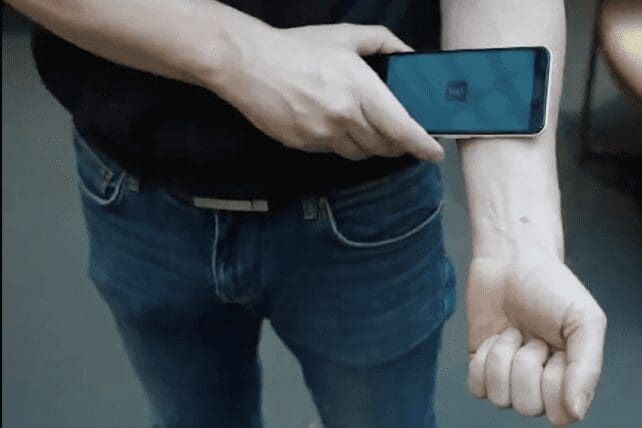As more cities and venues require proof of vaccination against COVID-19, Americans may soon have a high-tech option: an implanted microchip that serves as a vaccine passport. The technology, under development for years, is popular in Europe and lauded for its convenience.
However, the concept of a device embedded under the skin has sparked talk about the biblical mark of the beast, adding to fears and conspiracy theories about the COVID vaccine.
How the Microchip Implant Works
Last week, the South China Morning Post tweeted a video about the microchip and the implant process. Epicenter, a company in Stockholm, Sweden, has been developing the technology for years, well before the pandemic. Via syringe, a chip the size of a rice grain is inserted just below the skin, usually in the arm or hand. When a smartphone is held over that area, a QR code with immunization information appears.
On December 1, Sweden mandated that people attending events with more than 100 people must show proof of COVID vaccination. That announcement, local media report, has led to an increase in microchip usage, with about 6,000 takers so far. Sweden has been on the cutting edge of this technology, with the state-owned railway accepting tickets via microchip since 2017.
The implant process is “completely reversible,” according to developers. Though the microchips aren’t yet available to buy, creators predict they’ll be a hit due to convenience. “It basically replaces a lot of things you have, other communication devices, whether it be credit cards or keys,” says Epicenter co-founder Patrick Mesterton.
RELATED: Francis Collins ‘A Bit’ Frustrated With Evangelicals Amid COVID-19 Vaccine Push
The implants use “radio-frequency identification,” which involves electromagnetic fields, plus “near-field communications,” also used for contactless phone and credit card purchases. In 2015, more than 100 Epicenter employees voluntarily received microchips for easy access to doors, printers, and even cafeteria purchases. A Wisconsin company also made headlines for doing that in 2017.
Implants Raise ‘Mark of the Beast’ Fears
Proponents say microchip implants are incredibly versatile—and that vaccine info is just one of many types of data the chips can store. “Right now, it’s very convenient to have COVID passports always accessible on your implant,” says Hannes Sjöblad of Epicenter. “So of course, that’s how we use this technology today. Next year we are going to use it for something else.”
The chips eliminate the need to carry around a physical vaccine card, and no special phone app is required. “In case your phone runs out of battery, [data is] always accessible to you,” Sjöblad adds.
RELATED: Greg Laurie Answers ‘Is the COVID-19 Vaccine the Mark of the Beast?’

